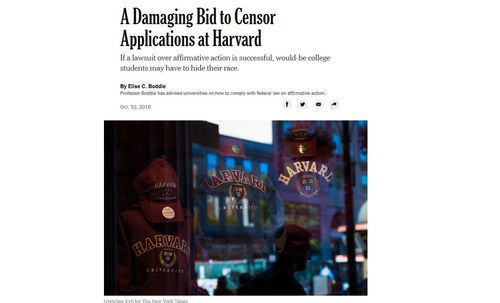
What if College Applicants Couldn’t Mention Their Race?
10/10/2018
A Damaging Bid to Censor Applications at Harvard
If a lawsuit over affirmative action is successful, would-be college students may have to hide their race.
By Elise C. Boddie [Pictued right] Oct. 10, 2018
Professor Boddie has advised universities on how to comply with federal law on affirmative action.
Being black enough to qualify for affirmative action has been very, very good to Prof. Boddie’s career.
Imagine this scenario: An admissions officer sits down to read a stack of applications, but they’re heavily redacted because the college must censor all references to an applicant’s race.
Okay, let me try to imagine this … Hmmmmmmm … Sounds good! Let’s do it.
It would be a lot like how applicants for openings in symphony orchestras audition behind a curtain. Or how law school tests are graded “blind” without the grader knowing the name of who took the test.
The admissions officer can consider an applicant’s gender, where she grew up, whether she preferred the Yankees to the Red Sox and every other conceivable part of her background or identity. But not her race, even if it had a formative impact on her life.
That could become the reality for every college if a group of Asian-American students denied admission to Harvard wins a lawsuit. They want to outlaw the modest use of race in admissions that the Supreme Court has twice upheld as vital to college students’ education. …
The lawsuit asks the court to bar colleges from being able to consider, learn about or even become aware of an applicant’s race. Eventually, applicants might stop discussing their race altogether, omitting things like leadership roles in their high school’s Latino Student Alliance or choosing not to write about icons like Dolores Huerta — all because they might be worried about indicating their racial identity.
This case could have a devastating impact. Consider a black student who grew up on the South Side of Chicago or a Hmong applicant who lives in a working-class neighborhood in Minneapolis. Both of them have likely had very different experiences from white applicants.
Under Harvard’s current admissions process, they could discuss the role race played in their lives. A white applicant might also want to share her experiences with race.
Suggested prompt for a white applicant wanting to write about race under the current system: “Gradually I began to hate my ancestors.”
Anyway, the college application essay is at present one of the ways young people are instructed that being whiny and woke is the way to get ahead in The Current Year. Restricting essays to impersonal topics — E.g., Write about something you have learned and why it’s interesting — would be a good way instead to get across the message that college is for learning about the real world.
Look, the current college system appears to be damaging the mental health of college students, if the data collected in The Coddling of the American Mind is reliable. Why not experiment with alternatives in the hope of finding methods that are less detrimental to the health and happiness of the young?

